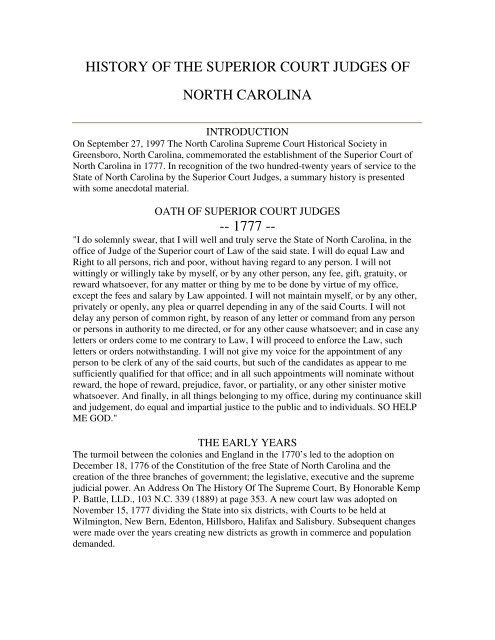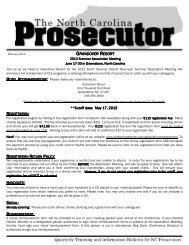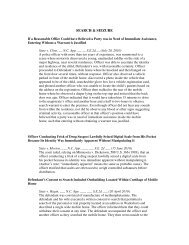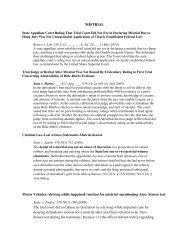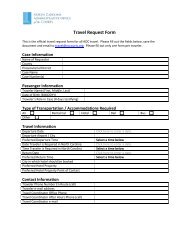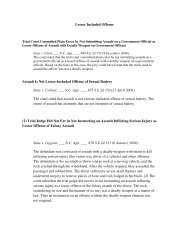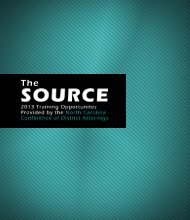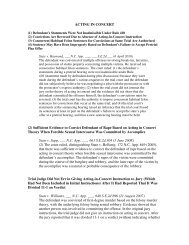history of the superior court judges of north carolina -- 1777
history of the superior court judges of north carolina -- 1777
history of the superior court judges of north carolina -- 1777
You also want an ePaper? Increase the reach of your titles
YUMPU automatically turns print PDFs into web optimized ePapers that Google loves.
HISTORY OF THE SUPERIOR COURT JUDGES OFNORTH CAROLINAINTRODUCTIONOn September 27, 1997 The North Carolina Supreme Court Historical Society inGreensboro, North Carolina, commemorated <strong>the</strong> establishment <strong>of</strong> <strong>the</strong> Superior Court <strong>of</strong>North Carolina in <strong>1777</strong>. In recognition <strong>of</strong> <strong>the</strong> two hundred-twenty years <strong>of</strong> service to <strong>the</strong>State <strong>of</strong> North Carolina by <strong>the</strong> Superior Court Judges, a summary <strong>history</strong> is presentedwith some anecdotal material.OATH OF SUPERIOR COURT JUDGES-- <strong>1777</strong> --"I do solemnly swear, that I will well and truly serve <strong>the</strong> State <strong>of</strong> North Carolina, in <strong>the</strong><strong>of</strong>fice <strong>of</strong> Judge <strong>of</strong> <strong>the</strong> Superior <strong>court</strong> <strong>of</strong> Law <strong>of</strong> <strong>the</strong> said state. I will do equal Law andRight to all persons, rich and poor, without having regard to any person. I will notwittingly or willingly take by myself, or by any o<strong>the</strong>r person, any fee, gift, gratuity, orreward whatsoever, for any matter or thing by me to be done by virtue <strong>of</strong> my <strong>of</strong>fice,except <strong>the</strong> fees and salary by Law appointed. I will not maintain myself, or by any o<strong>the</strong>r,privately or openly, any plea or quarrel depending in any <strong>of</strong> <strong>the</strong> said Courts. I will notdelay any person <strong>of</strong> common right, by reason <strong>of</strong> any letter or command from any personor persons in authority to me directed, or for any o<strong>the</strong>r cause whatsoever; and in case anyletters or orders come to me contrary to Law, I will proceed to enforce <strong>the</strong> Law, suchletters or orders notwithstanding. I will not give my voice for <strong>the</strong> appointment <strong>of</strong> anyperson to be clerk <strong>of</strong> any <strong>of</strong> <strong>the</strong> said <strong>court</strong>s, but such <strong>of</strong> <strong>the</strong> candidates as appear to mesufficiently qualified for that <strong>of</strong>fice; and in all such appointments will nominate withoutreward, <strong>the</strong> hope <strong>of</strong> reward, prejudice, favor, or partiality, or any o<strong>the</strong>r sinister motivewhatsoever. And finally, in all things belonging to my <strong>of</strong>fice, during my continuance skilland judgement, do equal and impartial justice to <strong>the</strong> public and to individuals. SO HELPME GOD."THE EARLY YEARSThe turmoil between <strong>the</strong> colonies and England in <strong>the</strong> 1770’s led to <strong>the</strong> adoption onDecember 18, 1776 <strong>of</strong> <strong>the</strong> Constitution <strong>of</strong> <strong>the</strong> free State <strong>of</strong> North Carolina and <strong>the</strong>creation <strong>of</strong> <strong>the</strong> three branches <strong>of</strong> government; <strong>the</strong> legislative, executive and <strong>the</strong> supremejudicial power. An Address On The History Of The Supreme Court, By Honorable KempP. Battle, LLD., 103 N.C. 339 (1889) at page 353. A new <strong>court</strong> law was adopted onNovember 15, <strong>1777</strong> dividing <strong>the</strong> State into six districts, with Courts to be held atWilmington, New Bern, Edenton, Hillsboro, Halifax and Salisbury. Subsequent changeswere made over <strong>the</strong> years creating new districts as growth in commerce and populationdemanded.
The Act <strong>of</strong> <strong>1777</strong> created three Judges’ positions which were described in <strong>the</strong> new law as"Superior Court", a probable adoption from <strong>the</strong> Act <strong>of</strong> 1767 which used <strong>the</strong> same term,when it would have been constitutionally correct to refer to <strong>the</strong> new judicial positions as<strong>the</strong> "Supreme Court". The Judges not only acted as Trial Judges but two Judges could sitas an appellate or Supreme Court.It is worth nothing that one <strong>of</strong> <strong>the</strong> earliest and most significant decisions rendered by <strong>the</strong>Superior Court Judges sitting as an appellate <strong>court</strong> was Bayard v. Singleton, 1 N.C.(Mart.) 5 (1787), in which <strong>the</strong> three Superior Court Judges sitting as an appellate <strong>court</strong>ruled that <strong>the</strong> Courts do have <strong>the</strong> power and duty to declare an act <strong>of</strong> <strong>the</strong> Legislatureunconstitutional, this opinion predating Marbury v. Madison by 15 years.Under <strong>the</strong> Constitution <strong>of</strong> 1776, Judges held <strong>of</strong>fice during good behavior and wereelected by <strong>the</strong> General Assembly. This selection process remained unchanged until <strong>the</strong>Constitutions <strong>of</strong> 1868 and 1876 when election was given to <strong>the</strong> people and vacanciesfilled by <strong>the</strong> Governor until <strong>the</strong> next general election. An Address On The History Of TheSupreme Court, By Honorable Kemp P. Battle, LLD., 103 N.C. 339 (1889) at page 363.The first three Judges elected were Samuel Ashe <strong>of</strong> New Hanover County; SamuelSpencer <strong>of</strong> Anson County; and James Iredell <strong>of</strong> Chowan County. Iredell resigned afterriding one circuit and John Williams <strong>of</strong> Granville County took his place. Iredell wassubsequently appointed by President Washington to serve on <strong>the</strong> United States SupremeCourt. Ashe served until 1795 when he was elected Governor; Williams served until hisdeath in 1799 and Spencer served until his death in 1794. An Address On The History OfThe Supreme Court, By Honorable Kemp P. Battle, LLD., 103 N.C. 339 (1889) at page354.In 1818, <strong>the</strong> Legislature finally divided <strong>the</strong> responsibilities and created a Supreme Court,consisting <strong>of</strong> three Judges. The creation <strong>of</strong> this new appellate <strong>court</strong> did not go withoutcriticism including objections to <strong>the</strong> extravagant salaries set at $2,500 per year, life tenureappointments, long journeys that lawyers had to undertake from <strong>the</strong> western counties, andSuperior Court Judges who resented being reversed on appeal.North Carolina Manual, 1993-1994, Chapter Four, The Supreme Court <strong>of</strong> North Carolina:A Brief History, at page 606."The Constitution <strong>of</strong> 1868 made <strong>the</strong> Supreme and Superior Courts constitutional <strong>of</strong>ficesand beyond repeal by legislative action. It also made <strong>the</strong> <strong>judges</strong> elective by <strong>the</strong> people for<strong>the</strong> term <strong>of</strong> eight years."History Of The Supreme Court Of North Carolina by Chief Justice Walter Clark, 177N.C. 617 (1919) at page 618.ROTATION(RIDINGS)
. . . ". The principle <strong>of</strong> rotating Superior Court Judges among <strong>the</strong> various districts <strong>of</strong> adivision is a salutary one and shall be observed." Constitution <strong>of</strong> North Carolina (1970)as Amended; Article IV, Sec. 11."In 1790, Halifax, Edenton, New Bern, and Wilmington districts were constituted <strong>the</strong>Eastern Riding, and Morganton, Salisbury, Fayetteville, and Hillsboro, <strong>the</strong> Western. Thenumber <strong>of</strong> <strong>judges</strong> was increased to four, by <strong>the</strong> election <strong>of</strong> Judge Spruce McKay, and two<strong>judges</strong> were assigned to hold <strong>the</strong> <strong>court</strong>s, jointly, in each riding."History Of The Supreme Court Of North Carolina by Chief Justice Walter Clark; 177N.C. 617 (1919) at page 619.Because <strong>of</strong> hardships due to distances imposed on <strong>the</strong> people in trying to attend to <strong>court</strong>business, in 1806 changes were made in <strong>the</strong> Court system. Superior Courts were to beheld semiannually in each county by a single judge. "The counties were grouped into sixcircuits, called also ridings, but <strong>the</strong> <strong>judges</strong> were to ride in rotation." History Of TheSupreme Court Of North Carolina by Honorable Kemp P. Battle, at page 358."Till 1856 <strong>the</strong>se <strong>judges</strong> met and <strong>the</strong>mselves allotted <strong>the</strong> ridings, <strong>the</strong> only restriction beingthat no judge should hold <strong>the</strong> same riding twice in succession. In 1857 this was changedto require <strong>the</strong> <strong>judges</strong> to hold every district in <strong>the</strong> whole State in regular rotation. By <strong>the</strong>Constitution <strong>of</strong> 1868 <strong>judges</strong> <strong>of</strong> <strong>the</strong> Superior Court each held only his own district. In 1878this was changed back to require <strong>the</strong> Superior Court <strong>judges</strong> to ride <strong>the</strong> entire State inrotation. In 1910 <strong>the</strong> number <strong>of</strong> districts having increased to 20, it was felt to be ahardship that a judge should ride his own circuit only one time in twenty, . . . and <strong>the</strong>State, as in 1790, divided into two divisions."History Of The Superior Court Of North Carolina, Chief Justice Walter Clark, 177 N.C.617 (1919) at page 620.Modern day Superior Court Judges continue <strong>the</strong>ir "ridings" through <strong>the</strong> present fourdivisions and 40 Judicial Districts.Rotation has been part <strong>of</strong> <strong>the</strong> legal debate for many years. The pros and cons <strong>of</strong> rotationhave been captured in three excellent law review articles. Open Court, Rotation <strong>of</strong>Superior Court Judges, by John A. Livingstone, N.C. Law Review, Volume 6, 927-28, atpages 110-117; The Rotation <strong>of</strong> Superior Court Judges by William H. Bobbitt, Judge,Superior Court, N.C. Law Review, Volume 26, 1947-48, at pages 335-349; and <strong>the</strong>Rotation <strong>of</strong> Superior Court Judges, by J. Francis Paschal, N.C. Law Review, Volume 27,1948-49, at pages 181-203.The arguments against and for rotation have been summarized by J. Francis Paschal inhis article at pages 201-202:• (Con)". . . it renders almost impossible <strong>the</strong> definite fixing <strong>of</strong> individual responsibilityfor <strong>the</strong> swift and efficient administration <strong>of</strong> justice; that it is <strong>of</strong>ten a stimulus to delaywhen a lawyer, for any reason however trivial, prefers to take his chances with a judge
o<strong>the</strong>r than <strong>the</strong> one in his district; that it <strong>of</strong>ten forces a judge to spend in travel much timehe could, with great pr<strong>of</strong>it to himself and <strong>the</strong> State, devote to o<strong>the</strong>r things; that, despiteheroic efforts, it frequently results in a judge being unavailable when he is needed. Norhas anyone dared to assert that <strong>the</strong> system, as it has operated and as it operates now, is atall adapted to <strong>the</strong> effective disposition <strong>of</strong> chambers matters."• (Pro)"However great <strong>the</strong> burdens <strong>of</strong> rotation, it is said that we must bear <strong>the</strong>m for avariety <strong>of</strong> reasons. These can be briefly recapitulated: rotation is one <strong>of</strong> our oldesttraditions; it gives us a state-wide judiciary; it has exerted a unifying influence on <strong>the</strong>people <strong>of</strong> <strong>the</strong> State; it broadens <strong>the</strong> outlook <strong>of</strong> <strong>the</strong> judge; it guarantees an independent andimpartial judiciary."CONFERENCE OF SUPERIOR COURT JUDGEThe Conference <strong>of</strong> Superior Court Judges had its conceptual beginnings in <strong>the</strong> early1930’s as some Superior Court Judges ga<strong>the</strong>red on <strong>the</strong> Fourth <strong>of</strong> July weekends at <strong>the</strong> oldOcean Terrace Hotel at Wrightsville Beach, North Carolina. Apparently led by JudgeW.C. (Buck) Harris, <strong>the</strong>se Judges sat and rocked while discussing <strong>the</strong> array <strong>of</strong> judicialproblems.The first Conference <strong>of</strong> <strong>the</strong> Superior Court Judges <strong>of</strong> North Carolina convened on July14, 1939 at <strong>the</strong> Mt. Mitchell Game Refuge with 21 Judges present. Elected as <strong>of</strong>ficerswere Judge W. C. (Buck) Harris <strong>of</strong> Raleigh, President; Judge J. Will Pless, Jr. <strong>of</strong> Marion,Vice President; and Henry L. Stevens, Jr. <strong>of</strong> Warsaw, Secretary-Treasurer.The Conference <strong>of</strong> Superior Court Judges has been directly or indirectly influential inmany <strong>of</strong> <strong>the</strong> vast improvements in <strong>the</strong> Court System through its Pattern Jury Instructions,Bench Book, legislative suggestions, and its Continuing Judicial Education programs.Much <strong>of</strong> <strong>the</strong> Conferences’ success is due to <strong>the</strong> Institute <strong>of</strong> Government and its dedicatedstaff.Although <strong>the</strong>re had been much discussion about <strong>the</strong> use <strong>of</strong> robes in <strong>the</strong> Courtroom bySuperior Court Judges, Superior Court Judges did not begin wearing robes until January1, 1958. A History Of <strong>the</strong> Conference Of Superior Court Judges Of North Carolina byHamilton H. Hobgood, Judge <strong>of</strong> <strong>the</strong> Superior Court, Retired, (1981) at page 20.Historically, Superior Court Judges have been individualists and some things seem tonever change. "Written polls <strong>of</strong> <strong>judges</strong> over <strong>the</strong> years on various propositions haveproven to be unsatisfactory. If <strong>the</strong> <strong>judges</strong> are in agreement, <strong>the</strong>re is no need for a poll. If<strong>the</strong>y are in disagreement, <strong>the</strong>re is no value in a poll. Several polls have resulted in aboutone-third <strong>of</strong> <strong>the</strong> <strong>judges</strong> being for <strong>the</strong> proposition, one-third being against, and one-thirdnot voting." A History Of The Conference <strong>of</strong> Superior Court Judges Of North Carolinaby Hamilton H. Hobgood, Judge <strong>of</strong> <strong>the</strong> Superior Court, Retired (1981) at page 31.UNUSUAL EVENTS
There are many wonderful stories and articles about events involving <strong>the</strong> Superior CourtJudges. Limitations <strong>of</strong> space do not permit a recounting <strong>of</strong> <strong>the</strong> numerous stories thatabound. The following are recited because each fell into <strong>the</strong> category <strong>of</strong> <strong>the</strong> unusual.• Turkey Gobbler AttackOf all <strong>the</strong> Superior Court Judges who have served, Judge Spencer’s death may have been<strong>the</strong> most unusual.Judge Spencer, in declining health, was at his home in Anson County in August, 1794."He was sitting on his piazza with red cap on his head, when it attracted <strong>the</strong> attention <strong>of</strong> aturkey gobbler. The judge being sleepy began to nod. The turkey mistaking <strong>the</strong> noddingand <strong>the</strong> red cap for a challenge to battle made violent and unexpected attack on HisHonor that he was thrown from his chair on <strong>the</strong> floor and was so beaten and bruised tha<strong>the</strong> died in a few days." History <strong>of</strong> Anson County, North Carolina, 1750-1976, by Mary L.Medley, at pages 68-69. The family <strong>of</strong> Judge Spencer countered this version byindicating that death was probably caused by a peck on <strong>the</strong> hand causing an infectionresulting in erysipelas which later brought on Judge Spencer’s death. History <strong>of</strong> AnsonCounty, North Carolina, 1750-1976, by Mary L. Medley, at page 69.• AssassinationThe most violent death <strong>of</strong> any sitting Superior Court Judge occurred in 1947. Theassassination is captured in <strong>the</strong> headlines and front page article <strong>of</strong> The Daily Advance,Elizabeth City, North Carolina. Monday, Evening, March 17, 1947, Final Edition, andreported as follows:G. E. Pritchard Kills Judge Thompson And Self . . .Judge C. Everette Thompson, resident judge <strong>of</strong> <strong>the</strong> First Judicial District since 1938 wasshot and instantly killed as he sat reading in <strong>the</strong> living room <strong>of</strong> his residence on WestChurch Street shortly after 9 o’clock last night by George E. Pritchard, who <strong>the</strong>n turned<strong>the</strong> shotgun upon himself, firing a charge <strong>of</strong> buckshot into his abdomen, dying 20 minuteslater in Albemarle Hospital.Pritchard, who was awaiting commitment to <strong>the</strong> State’s Prison to serve a year’s sentencefor libel imposed in Beaufort County Superior Court last November and recentlyconfirmed by <strong>the</strong> State Supreme Court, left seven copies <strong>of</strong> a letter in which he declaredhis intent to kill himself but which contained no direct threat upon <strong>the</strong> life <strong>of</strong> JudgeThompson though mentioning him, among o<strong>the</strong>rs, as <strong>the</strong> object <strong>of</strong> a long standinggrievance."Dueling Judges• Judge Alfred MooreAlfred Moore was a former Superior Court Judge from 1798-1800 and subsequently wasappointed to <strong>the</strong> United States Supreme Court and served for a brief period <strong>of</strong> time beforeretiring because <strong>of</strong> ill health and <strong>the</strong>reafter settling in Brunswick County.
Benjamin Smith, a man <strong>of</strong> wealth and notoriety as well as a reputation for dueling, had adisagreement with his cousin, Judge Alfred Moore. Judge Moore because <strong>of</strong> ill healthcould not physically meet any challenge to duel. The issue was taken up by JudgeMoore’s bro<strong>the</strong>r, Captain Maurice Moore, who challenged Smith to a duel. The NorthCarolina authorities tried to prevent <strong>the</strong> affair because dueling was illegal in <strong>the</strong> state, but<strong>the</strong> parties simply moved across <strong>the</strong> state line into South Carolina and proceeded with <strong>the</strong>duel. Smith received a ball in <strong>the</strong> right side. Captain Moore was unhurt. Smith wastransported back to Wilmington, North Carolina, where he recovered. Smith later servedas Governor <strong>of</strong> North Carolina from December, 1810 to December, 1811.The History <strong>of</strong> Brunswick County, North Carolina by Lawrence Lee (1980) at pages 139-140.• Judge Duncan CameronJudge Duncan Cameron who served as a Superior Court Judge from 1814-1816 also wasinvolved in a duel. There are no details but <strong>the</strong> event is simply reported as follows:"Honorable Duncan Cameron and William Duffy, met near Hillsboro; Judge Cameronwounded. Duffy represented Fayetteville in <strong>the</strong> legislature <strong>of</strong> 1806."Wheeler’s Reminiscences, Craven County, at page 135.Robeson, Sampson & Duplin County Bars Cited for ContemptOne <strong>of</strong> <strong>the</strong> great stories about <strong>the</strong> relationship, or <strong>the</strong> lack <strong>the</strong>re<strong>of</strong>, between <strong>the</strong> judiciaryand <strong>the</strong> bar is captured in The State <strong>of</strong> Robeson by Robert C. Lawrence (1939) in asection at pages 88-92 that Mr. Lawrence entitled "The Famous Peebles Contempt Case."The article is quoted in its entirety so as to not diminish <strong>the</strong> visual images and feelingsthat spring from <strong>the</strong> writing <strong>of</strong> Mr. Lawrence who was himself a participant."As I look back on this famous case after <strong>the</strong> lapse <strong>of</strong> thirty-five years, I amchiefly impressed with <strong>the</strong> foolish things done by those involved on both sides<strong>of</strong> <strong>the</strong> controversy. The parties were all lawyers, and should have known how torestrain <strong>the</strong>mselves. But reason does not reign when anger has its sway, andanger certainly had its sway at that time. I do not feel that <strong>the</strong> final resultsreflected credit upon ei<strong>the</strong>r side."Judge Robert B. Peebles <strong>of</strong> Northampton county was a captain in <strong>the</strong> Confederate army,served with distinction in both branches <strong>of</strong> <strong>the</strong> legislature, and was <strong>the</strong> foremost figure inthis section <strong>of</strong> <strong>the</strong> State. He was a brave and incorruptible man and an able lawyer. But hewas lacking in judicial temperament, was inclined to partizanship (sic) in <strong>the</strong> trial <strong>of</strong>cases, and was intemperate in his habits. In 1904, he had but recently tried a famousmurder case at Raleigh, where his conduct had brought down upon him severe criticismfrom <strong>the</strong> Bar and press <strong>of</strong> <strong>the</strong> State. When <strong>the</strong> time approached for him to hold <strong>court</strong> inRobeson, our Bar, under <strong>the</strong> leadership <strong>of</strong> Col. N. A. McLean, determined not to set acalendar, and not to try any cases before him.Court convened. There being no printed calendar (as we had not set a calendar) his honorgot out <strong>the</strong> original docket and one by one called over every case upon it -- several
hundred in number. As each case was called, Col. McLean would say ‘continued byconsent.’When <strong>the</strong> entire docket had been called, his honor turned a cold and fishy eye upon Col.McLean and demanded to know why <strong>the</strong> entire docket had been continued. The Coloneldeclined to say unless forced to speak by <strong>the</strong> <strong>court</strong>. His honor ruled that <strong>the</strong> Colonel mustspeak. The Colonel <strong>the</strong>n said that <strong>the</strong> reasons impelling <strong>the</strong> Bar were his honor’s want <strong>of</strong>judicial temper, his intemperate habits, and his partisanship. ‘Very well,’ said <strong>the</strong> Judge,‘<strong>court</strong> is adjourned.’"His honor proceeded to his home, where he wrote an affidavit charging that <strong>the</strong> conduct<strong>of</strong> our Bar was such as to bring <strong>the</strong> <strong>court</strong> into disrepute, and <strong>the</strong> Judge had this affidavitsigned by one <strong>of</strong> his friends at Jackson. Upon this affidavit, <strong>the</strong> Judge signed an orderrequiring our Bar to show cause before him, at Fayetteville, why we should not beattached for contempt <strong>of</strong> <strong>court</strong>, and ei<strong>the</strong>r fined or imprisoned in <strong>the</strong> discretion <strong>of</strong> <strong>the</strong><strong>court</strong>. This order was served by <strong>the</strong> Sheriff, and <strong>the</strong> Lumberton law <strong>of</strong>fices hummed withactivity. Our Bar prepared to give battle to <strong>the</strong> <strong>court</strong>. As I now recall, <strong>the</strong> members <strong>of</strong> ourBar served with this rule were:"Colonel N. A. McLean, (Governor), Angus W. McLean, J. Gilchrist McCormick,Stephen McIntyre, E. J. Britt, Robert E. Lee, Wade Wishart, D. Preston Shaw, R. B.Morrison, B. F. McLean, Leon T. Cook, <strong>the</strong> writer and possibly two or three o<strong>the</strong>rs."The Bar employed as counsel: Charles W. Tillett, <strong>of</strong> Charlotte, outstanding NorthCarolina lawyer; Charles M. Busbee, prominent member <strong>of</strong> <strong>the</strong> Raleigh bar; John D.Shaw, Jr., shrewd trial lawyer, <strong>of</strong> Laurinburg. Numerous lawyers volunteered <strong>the</strong>irservices, including that able lawyer, Union L. Spence, <strong>of</strong> Carthage, whose pr<strong>of</strong>fer <strong>of</strong> aidwas gladly accepted. Judge Peebles was represented by Col. Charles W. Broadfoot andHon. George M. Rose, both able Fayetteville lawyers, acting as ‘friends <strong>of</strong> <strong>the</strong> Court.’"We did not care to try <strong>the</strong> case at Fayetteville, where public sentiment was perhaps notunanimous in our favor, so in order to get an entirely friendly atmosphere, we made amotion for removal to Lumberton. As <strong>the</strong> law on this was clearly with us, his honorgranted our motion."Each side <strong>the</strong>n proceeded to ransack eastern North Carolina for affidavits. GovernorMcLean and <strong>the</strong> writer secured most <strong>of</strong> <strong>the</strong> affidavits for our side, many in number, allcontaining allegations <strong>of</strong> intemperance on <strong>the</strong> part <strong>of</strong> <strong>the</strong> Judge. His honor, assisted byCharles U. Harris <strong>of</strong> <strong>the</strong> Raleigh Bar, secured voluminous affidavits from scores <strong>of</strong>people to <strong>the</strong> effect that <strong>the</strong> designers had never seen <strong>the</strong> <strong>court</strong> under <strong>the</strong> influence <strong>of</strong>liquor. The affidavits got so voluminous that <strong>the</strong> writer carried ours in <strong>the</strong> largest briefcase he could find, whereas those filed by <strong>the</strong> Judge were so numerous that a large basketwas required to hold <strong>the</strong>m. Wherever <strong>the</strong> Judge went he would be closely followed byMr. Harris, carrying <strong>the</strong> basket containing <strong>the</strong> affidavits."Court convened for <strong>the</strong> trial at Lumberton, both sides as angry as men can get. The‘prisoners’ were all present -- many accompanied by <strong>the</strong>ir wives. His honor gallantlycame down from <strong>the</strong> bench and shook hands with <strong>the</strong> ladies, but simply glared at <strong>the</strong>ir
unfortunate husbands. A throng <strong>of</strong> people were present, crowding <strong>the</strong> <strong>court</strong> room andoverflowing into <strong>the</strong> corridors and <strong>court</strong> yard."Our counsel proceeded to read our affidavits. Among <strong>the</strong>se were ones from Col. E. W.Kerr and R. C. Su<strong>the</strong>rland, prominent members <strong>of</strong> <strong>the</strong> Sampson Bar, and one from aDuplin lawyer whose name I cannot now recall. These affidavits, along with many o<strong>the</strong>rs,alleged intemperance on <strong>the</strong> part <strong>of</strong> <strong>the</strong> Judge. When <strong>the</strong>se were read, his honor statedthat <strong>the</strong> hearing would be suspended temporarily until he could prepare some papers. The<strong>court</strong> began writing, and curiosity, especially on <strong>the</strong> part <strong>of</strong> <strong>the</strong> Bar, mounted. The Judgefinally inquired <strong>of</strong> <strong>the</strong> Sheriff (George B. McLeod) if he could carry out any orders <strong>the</strong><strong>court</strong> might give him. The Sheriff (naturally a warm partisan <strong>of</strong> <strong>the</strong> Bar) replied that hedid not know. ‘Well, make up your mind quick before I get a new Sheriff,’ said <strong>the</strong>Judge, in <strong>the</strong> face <strong>of</strong> a bitterly hostile audience. The Sheriff <strong>the</strong>n said he would serve anypapers <strong>the</strong> <strong>court</strong> wished served, and <strong>the</strong> <strong>court</strong> handed down papers which proved to beattachments for contempt against <strong>the</strong> Sampson and Duplin lawyers whose affidavits wehad read."But we did not allow <strong>the</strong>se gentlemen to be arrested. We phoned <strong>the</strong>m what hadhappened, and <strong>the</strong>y came immediately to Lumberton to be met by a host <strong>of</strong> people,attended by a brass band, and were escorted to <strong>the</strong> best rooms our hotel provided, -- tosuch an extent did feeling have its way!"The next day, his honor, ‘<strong>of</strong> his own knowledge’ found as a fact that <strong>the</strong> Sampson andDuplin lawyers had signed affidavits which were untrue and which reflected upon <strong>the</strong><strong>court</strong>. The <strong>court</strong> <strong>the</strong>refore found <strong>the</strong>m guilty <strong>of</strong> contempt and fined each $250.00 andcosts."Of course our counsel also acted as counsel for <strong>the</strong> gentlemen who had given usaffidavits, and we determined to apply to a supreme <strong>court</strong> justice for writs <strong>of</strong> habeus (sic)corpus. The Sampson and Duplin lawyers <strong>the</strong>refore refused to pay <strong>the</strong>ir fines and wentinto <strong>the</strong> technical custody <strong>of</strong> <strong>the</strong> Sheriff. Writs <strong>of</strong> habeas corpus were at once sued outbefore that great lawyer and beloved North Carolinian, Justice Henry G. Connor, <strong>of</strong> <strong>the</strong>Supreme Court."Came <strong>the</strong> hearing on <strong>the</strong> writs <strong>of</strong> habeas corpus. Justice Connor invited his colleague,Justice Robert M. Douglas, to sit with him. Charles W. Tillett <strong>of</strong> our counsel opened <strong>the</strong>argument, and his speech was so fiery, and his attack upon Judge Peebles so caustic, thatjustice Douglas left <strong>the</strong> bench and did not return. Justice Connor heard Mr. Tillett’sargument, <strong>the</strong>n adjourned <strong>the</strong> hearing for a few minutes, and sent for counsel on bothsides. At <strong>the</strong> hearing before Justice Connor, Judge Peebles was present himself, and wasrepresented by ex-chief justice James E. Shepherd as his counsel."Justice Connor told counsel for both sides that in his opinion <strong>the</strong> affair had gone farenough and should be stopped. He suggested that <strong>the</strong> Bar sign a statement that it meantno disrespect to <strong>the</strong> <strong>court</strong> (our grievance was with <strong>the</strong> man, not <strong>the</strong> <strong>court</strong>) and that JudgePeebles strike out his judgment against <strong>the</strong> Sampson and Duplin lawyers, and dismiss <strong>the</strong>
proceedings against <strong>the</strong>m and against us. This suggestion was accepted by both sides and<strong>the</strong> case was ended. The final judgment fur<strong>the</strong>r provided that all <strong>the</strong> proceedings be‘expunged’ from <strong>the</strong> records. This was done by drawing a red line diagonally across eachpage <strong>of</strong> <strong>the</strong> record!"OATH OF SUPERIOR COURT JUDGES-- 1997 --I do solemnly swear (or affirm) that I will administer justice without favoritism to anyoneor to <strong>the</strong> State; that I will not knowingly take, directly or indirectly, any fee, gift, gratuityor reward whatsoever, for any matter or thing done by me or to be done by me by virtue<strong>of</strong> my <strong>of</strong>fice, except <strong>the</strong> salary and allowances by law provided; and that I will faithfullyand impartially discharge all <strong>the</strong> duties <strong>of</strong> Superior Court Judge <strong>of</strong> <strong>the</strong> Superior CourtDivision <strong>of</strong> <strong>the</strong> General Court <strong>of</strong> Justice to <strong>the</strong> best <strong>of</strong> my ability and understanding, andconsistent with <strong>the</strong> Constitution and laws <strong>of</strong> <strong>the</strong> State, so help me, God.AuthorE. Lynn JohnsonSenior Resident Superior Court JudgeTwelfth Judicial District


